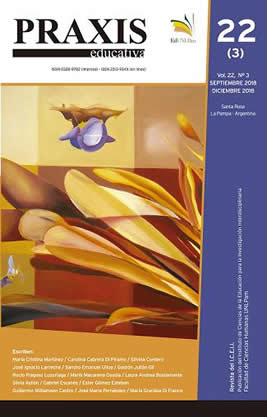A propósito del cruce universidad y perspectiva de género: un diagnóstico provisorio en Bahía Blanca, Argentina / On the crossing point between university and gender perspective: a provisory diagnosis in Bahía Blanca, Argentina
DOI:
https://doi.org/10.19137/praxiseducativa-2018-220303Palabras clave:
género y sexualidades, incidentes críticos, matriz universitaria, Bahía BlancaResumen
La Universidad Nacional del Sur, fundada como universidad nacional en el año 1956, funciona en la ciudad de Bahía Blanca con una oferta educativa amplia estructurada por departamentos académicos. Ésta no cuenta con institutos ni grupos constituidos vinculados al género o la perspectiva de la diversidad. Las acciones relacionadas con dichas temáticas se producen de un modo apartado, no como espacios vinculantes a nivel institucional. A partir de dos incidentes críticos relacionados con trabajos de investigación, se analizarán las tramas de poder que se producen al interior de la universidad y cómo los mecanismos institucionales pueden viabilizar o no el desarrollo de investigaciones, acciones políticas y subjetividades vinculadas con los géneros y las sexualidades. El propósito perseguido es abordar las tensiones que se suscitan entre el adentro y el afuera de la matriz universitaria en dichos temas, en virtud de demostrar los intereses contrapuestos: temáticos, académicos, presupuestarios y políticos, al interior de esta unidad universitaria.
Descargas
Citas
Blanco, R. (2014). “La estrategia metodológica de una investigación centrada en las regulaciones sexo genéricas en la universidad: reflexividad, implicación
y contramemoria”. En Cuadernos Intercambio sobre Centroamérica y el Caribe, 11(2), pp. 167-190.
Braidotti, R. (2004). Feminismo, diferencia sexual y sujeto nómade. Barcelona: Gedisa
Butler, J. (1990). El género en disputa. Barcelona: Paidós.
Butler, J. (2004). Deshacer el género. Barcelona: Paidós.
Chevallard, I. (1997). La Transposición didáctica. Buenos Aires: Aique.
Diez, J.I. (2010). Desarrollo endógeno en Bahía Blanca: empresas, organizaciones y políticas públicas. Universidad Nacional del Sur: EdiUNS.
Donoso-Vázquez, T. y Velasco-Martínez, A. (2013). ¿Por qué una propuesta de formación en perspectiva de género en el ámbito universitario? Universidad de Granada.
Elías, N. (2009). El proceso de la civilización. Buenos Aires: Fondo de Cultura Económica.
Feixa, C. (1998). De jóvenes, bandas y tribus: antropología de la juventud. Barcelona: Ariel.
Fernández, L. (2013). Instituciones educativas. Buenos Aires: Paidós.
Formiga, N. (1995). La globalización y la dinámica de los lugares: El caso de Bahía Blanca en el contexto de integración del Mercosur. Universidad Complutense de Madrid
Fox Keller, E. (2000). Lenguaje y vida. Buenos Aires: Manantial.
Lindón, A. y Hiernaux, D. (2011). Los Giros de la Geografía Humana. Desafíos y horizontes. México: Anthropos.
McNee, B. (1984). “If You Are Squeamish”. En East Lakes Geographer, vol.19, pp. 16-27.
Moreno, A. (2008). “La invisibilidad como injusticia. Estrategias del movimiento de la diversidad sexual”, en Pecheny, M.; Figari, C.; Jones, D. (comp.). Todo sexo es político. Buenos Aires: Del Zorzal.
Morgade, G. (2011). Toda educación es sexual: hacia una educación sexuda justa. La Crujía.
Ortega, A. O. y Pecheny, M. (2010). Enseñanza universitaria sobre género y sexualidades en Argentina, Chile, China, México y Sudáfrica. Teseo.
Pecheny, M.; Figari, C. y Jones, D. (2008). Todo sexo es político. Buenos Aires: Del Zorzal.
Segato, R. (2013). La escritura en el cuerpo. Buenos Aires: Tinta Limón.
Urriza, G. (2003). El mercado del suelo urbano en Bahía Blanca, Argentina; la consolidación de un modelo de crecimiento urbano de diferenciación socio-espacial. Pontifica Universidad Católica de Chile.
Publicado
Número
Sección
Licencia
Nota de copyright
Comité Editorial Revista Praxis educativa:
Por la presente declaro que soy autor del artículo titulado (nombre del artículo), que el mismo es original y propio y que no fue publicado en ningún otro formato o soporte con anterioridad. Manifiesto conocer que la revista no me cobrará ningún tipo de tasa bajo ningún concepto, ni recibiré ningún tipo de compensación monetaria
Si el mismo fuera aceptado para su publicación en Praxis educativa, autorizo a la referida revista a publicarlo en forma digital y a publicitarlo en sus redes sociales.
Si el trabajo fuera publicado, adhiero a la licencia Creative Commons denominada “Atribución - No Comercial Compartir igual CC BY-NC-SA”, mediante la cual se permite copiar, reproducir, distribuir, comunicar públicamente la obra y generar obras derivadas, siempre y cuando se cite y reconozca al autor original. Esta licencia se utiliza desde septiembre 2018. En 2016 se adhirió a CC BY NC ND 4.0; y en años 2017 y 2018 (enero -agosto) CC BY NC 4.0..
Esta licencia CC BY-NC-SA Compartir igual no permite, sin embargo, utilizar la obra con fines comerciales. Como autor la revista podré establecer acuerdos adicionales para la distribución no exclusiva de la versión de la obra publicada en la revista me permite el autoarchivo de los artículos publicados, en su versión post-print, en repositorios institucionales, temáticos, páginas web personales o cualquier otro uso pertinente. con el reconocimiento de haber sido publicado primero en esta revista.
Praxis educativa adhiere a DORA (Declaration on Research Assessment) firmada en San Francisco, California, el 16 de diciembre de 2012, y a la Declaración de México (Declaración Conjunta LATINDEX - REDALYC - CLACSO - IBICT).















_(1)2.png)


3.png)










_(2).png)






2.jpg)
8.png)









